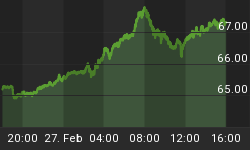In March, with inflation fears in a frenzy, we argued that the only way to "inflation proof" your investment portfolio was to take the hype as a warning for a sell-off.
"Whenever you find yourself on the side of the majority, it is time to stop and reflect." ~ Mark Twain
Commodities broke hard last week. According to Reuters: "Never before had crude oil plummeted so deeply during the course of a day...The rare moves of $10 a barrel usually are set off by dramatic events -- the outbreak of the first Gulf War in 1991, or the collapse in 2008 of Lehman Bros bank, which both led to recessions."
In March, we reminded investors that the oil rise "helped break the financial system in 2008. We look for it to happen again in 2011." Our conclusion was to "urge investors to use this time to reduce risk, get liquid and secure your investment portfolio" (if they haven't already done so).
Interestingly enough, as the chart below shows, there is more leverage in the stock market now than before the collapse of Lehman Brothers.
"When you combine ignorance and leverage, you get some pretty interesting results." - Warren Buffett
During the recent oil sell-off, which encompassed all markets to some degree, "''Funds were likely to take profits before June when the direct (Fed) bond purchases stop. All were eyeballing each other to see who would take profits first,' said a London-based oil trader."
When valuations are high, this game of chicken ends up convincing investors to stay past the peak. The smartest investors sell when regular investors are piling in and the mania is at fever pitch. While George Soros was selling according to the WSJ, "day traders were going crazy." If a trend ever gets to this level of excitement, cross it off your list if you are a buyer or sell if you already own, i.e. do what Soros does.
Professionals Go To Cash
If you haven't already liquidated your portfolio of stocks, bonds and money market fund shares and moved to cash you are already late. Bill Gross, who runs the world's largest bond fund and co-founder of PIMCO, is now 31% in cash - the most ever for the BOND fund. Jeremy Grantham, co-founder of GMO LLC (which serves institutional investors), wrote in his Quarterly Report published May 11, 2011: "the environment has simply become too risky to justify prudent investors hanging around, hoping to get lucky. So now is not the time to float along with the Fed, but to fight it." His advice to investors is to have "extra cash reserves and patience." Another sage, Jim Grant, author of the Grant's Interest Rate Observer, has spent pretty much all of his entire career since 1983 railing against the weak dollar (and rightly so). In an April interview however, he believes that after a sharp burst of inflation a "terrific chaos in investment markets" will occur where "liquidity would come into its own very suddenly." He is even forced to admit that U.S. dollars would become "precious and valuable", while recognizing that he is in the "habit of disparaging them...because they are paper." These paper dollars are needed by banks to hold against paper losses and for investors to pay down debts used in speculation.
Since February, the 3-month T-Bill yield has moved back down to almost zero. We've already had our bout of inflation; the rush into cash is already on. We should expect a collapse of leverage.
***More For Clients and Subscribers - To Subscribe To Our Full Report or View our Archives Visit Our Website***
Full Disclosure: Paul J. Lamont holds a small S&P500 put option position.
At Lamont Trading Advisors, we provide wealth preservation strategies for our clients. For more information, feel free to contact us. Our monthly Investment Analysis Report requires a subscription fee of $40 a month. Current subscribers are allowed to freely distribute this report with proper attribution.
***No graph, chart, formula or other device offered can in and of itself be used to make trading decisions. This newsletter should not be construed as personal investment advice. It is for informational purposes only.
















